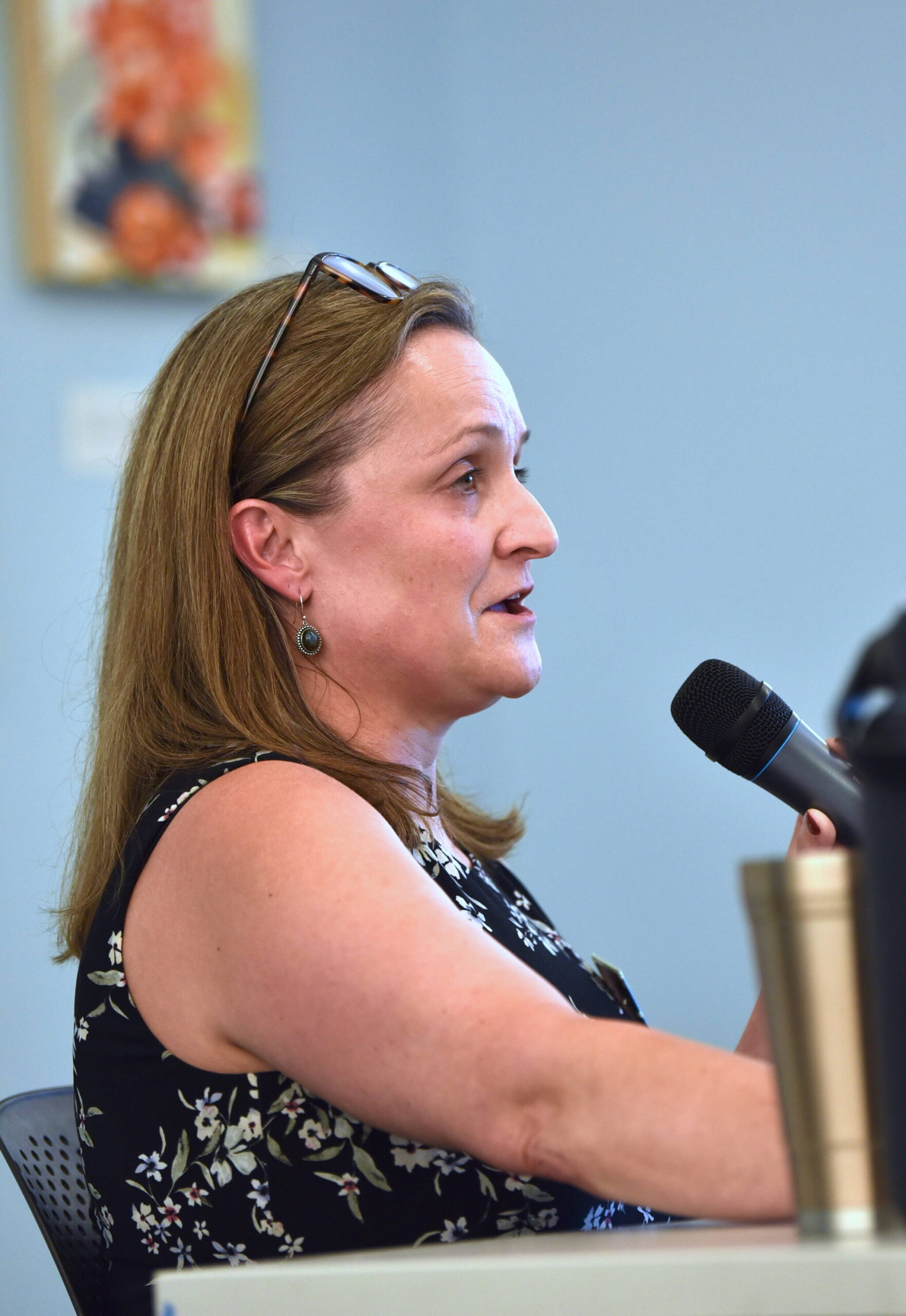Housing Resources Bainbridge held a candidate forum at the Bainbridge library July 13 to ask candidates running for City Council where they stand on affordable housing issues.
The only contested race matches incumbent Kirsten Hytopoulos against Dick Haugan, a former councilmember. They are the only two vying for that spot so they both will advance to the general election in November.
The other three candidates are all running uncontested so they all will be elected unless someone mounts a write-in campaign. They are incumbents mayor Brenda Fantroy-Johnson and Leslie Schneider and Ashley Mathews, who is on the planning commission.
Maggie Rich of HRB asked questions about their commitment to affordable housing, the link between diversity and affordable housing, what they think about state laws and local changes, the Housing Action Plan, and solutions to barriers to affordable housing.
More than 55 people attended the standing-room-only event.
Question 1: How would you demonstrate your commitment to affordable housing on BI?
Haugen said he demonstrates his commitment by learning about HRB, “I decided that it’s a pretty good model,” he said, adding he would bring business sense to the council. “I’ve run large companies and am probably the only person on the council who would have had a budget that’s as big as what the city has. The pragmatic aspect of my business experience, my longevity on the island, and my understanding of island culture is what I think I bring to the equation.”
Hytopoulos said she has a strong record on affordable housing and supports permanent affordability. “I’m willing to make courageous votes on behalf of affordable housing.”
Fantroy-Johnston said council members demonstrate how they feel about an issue with their votes. “I was one of the first people to stand up for affordable housing when we did not have a Housing Action Plan.”
Question 2: How are affordable housing and diversity linked, and why is this conversation important?
Mathews said she bristles at the assumption that people of color can only come to BI because they can afford it. But she also sees economic and age diversity that affects many. “All kinds of diversity is important, but don’t tie racial diversity to affordability.”
Schneider said market forces will ensure that “only rich people and people who hold their houses for a really long time can afford to live here, and that just screams lack of diversity in pretty much any way you can think about it. We need to make sure that we have enough economic diversity so that there are people who want to work here and can afford to live here.”
Haugan thinks the living environment here is much better than in other parts of the country and added, “The most important thing to do throughout this whole process of affordable housing is to get a really clear path, a really clear vision, and bring people along.”
Question 3: How will you lead BI through the changes that come with planning for more affordable housing?
Hytopoulos said she would lead BI as a collaborative mediator. “We’re going to do it well, and we’re going to stop treating it like a zero-sum game. And we’re going to work together.”
Schneider said we need affordable housing at many different levels of income. “I think that there’s going to be a different strategy that’s needed for each of those different levels.”
Fantroy-Johnston said: “We have to get a handle on it. We have to figure out how we want to do it before it’s dictated to us.” She said the city needs to act on recommendations in the Housing Action Plan. “We need to start listening to what they’re telling us, stop making it up as we go.”
Question 4: What specific action do you hope to have accomplished in one year? How will you be a part of making sure it happens?
Haugan said he wants to put ideas down on paper. “It’s a matter of looking at our plan and how we’re progressing against or working against it. The other thing I would do is talk to other people like Habitat for Humanity, who also has a program that could be part of this—not just HRB.”
Schneider wants to create a program to increase housing stock from existing homes by encouraging owners to sell a deed restriction to the city. “This is not affordable housing that we have to build; it exists already. And you can pull it off the market, little by little over time.”
Mathews added, “I really want to put the action part in the Housing Action Plan.”
Question 5: What is the biggest barrier to accomplishing more progress regarding affordable housing? And what will you do to address it?
Hytopoulos said the biggest barrier to affordable housing is cost. “We live in an incredibly expensive, beautiful, amazing place, and it’s very expensive to live here.” She said the city needs to build the homes. “We have a City Council that is in 100% consensus onboard to build affordable-housing projects. We need to find ways to incentivize for-profit developers to do that.”
Fantroy-Johnston said the biggest barrier to accomplishing more is fear. “We are paralyzed. Government tends to talk about it and talk about how they talked about it. Then they will tell you some more about it. Vote on it and get a committee together. We’ve been paralyzed, we haven’t been acting.”



